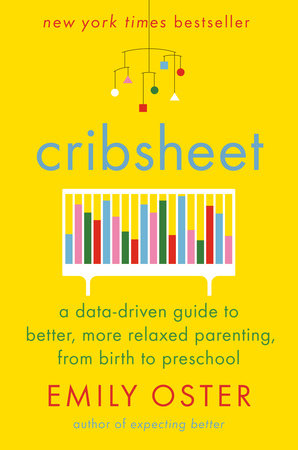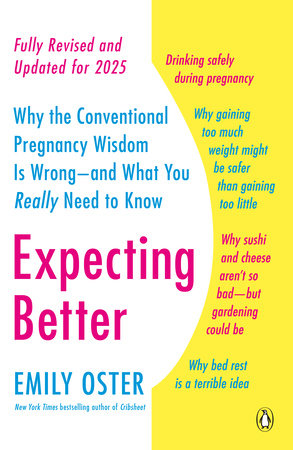How Emily Oster’s Cribsheet Uses Data to Help Make Parenting Less Stressful
by Jennifer Garry
An award-winning economist and mother of two, Emily Oster investigates parenting from an often overlooked angle in her new book, Cribsheet: A Data-Driven Guide to Better, More Relaxed Parenting, From Birth to Preschool. Rather than getting swept up in emotion or bogged down in conflicting information from every mother in your contact list, Oster empowers parents to make fact-based decisions that reflect what’s best for their unique family.
Oster’s no-nonsense approach has gained her a fan in comedian Amy Schumer, who recently hosted Oster on her podcast. “Emily Oster is the nonjudgmental girlfriend holding our hand and guiding us through pregnancy and motherhood,” Schumer said. “She has done the work to get us the hard facts in a soft, understandable way.”
I spoke with Oster about her new book and her own parenting choices, and the answers were both refreshing and enlightening.
I know you’re an economist and a lot of your work is data-driven, but was there something specific that inspired you to turn that lens to parenting?
Yes, very specific: my daughter, Penelope! Basically, I got pregnant and I found myself somewhat frustrated with all the advice, judgment, and lack of evidence for everything they told me I should and shouldn’t do. I started using the tools I use all the time in my job to look at the questions that were coming up in my pregnancy. In the end, all that research led to my first book, Expecting Better.
Cribsheet is the natural next step, though I will say that I think it required me to have a second child to really be able to write it. With my daughter, especially in infancy, the decisions came so fast, and I was so unprepared. It was hard to think about what the “right” thing to do was. We were just reacting. With my second, I was more prepared for the major decisions, and I think ultimately more prepared to write about strategies for making those decisions in ways that work for individual families.
When you were writing the book, did you have a goal in mind?
Very broadly, to make the early years of parenting less stressful. In these first years, every decision seems so important — even very small choices seem like they might make or break your child’s success and happiness. The societal rhetoric around parenting isn’t helping matters. My goal with the book is to bring some hard facts to these debates, but also to help parents understand there are many good choices, and what works for one family may not be the right choice for another.
What is the most surprising thing you uncovered?
I was broadly surprised that the quality of evidence on many of these parenting decisions is so poor. Given how important these choices are to so many parents, I wish we could be more concrete with the evidence!
A particular example of this that I found striking was around the introduction of solid foods. Everyone is so clear with you as a new parent that you should start by introducing rice cereal, then vegetables, then fruits, and to wait three days between introductions, and so on. It turns out that while there might be some logic to this, there’s no evidence that it’s important to do it this way.
Which parenting decisions based on your research did you find to be the most impactful for your family?
I do try to practice what I preach, in the sense that most of the research for the book was in the service of my own parenting choices. That makes this a question about which parenting decision matters most for my family. Probably the answer to that is our choices about sleep, as those really influence day-to-day life.
More interesting, though, is there is one case — discipline for toddlers — where the process of writing the book actually changed what we did with our kids. I hadn’t done much research on toddler discipline, but my editor insisted (correctly) that we have a chapter on it. Once I did the research, I was surprised by the quality of evidence on some kinds of discipline choices. We ended up incorporating some of these into our parenting practice, mostly successfully. It was one of few examples where the book influenced parenting for me, rather than my parenting driving the book.
What was your favorite finding?
My favorite finding is probably about allergen introduction, both because of the content and because the process of research is so interesting.
For many years the advice parents were given was to introduce allergens — peanuts being the prime example — later in life, after one year, perhaps even after two. The concern was that early allergen exposure could be risky if a child was allergic. At some point recently, a researcher in the UK observed that children in Israel were much less likely than those in the UK to have a peanut allergy, and he speculated this was because they were more commonly exposed to peanuts early (through a popular snack for babies).
What’s great about this is that he ran a randomized trial to test his hypothesis. This is a good example of how some less convincing data — comparing across countries — can inspire people to get better data. In the end, the randomized data showed that, indeed, exposing children to allergens very early actually prevents allergies from developing.
I love that you don’t tell people there’s one “right” way of doing things, but instead encourage parents to consider all the information and choose what’s best for their family. It makes so much sense! Why do you think it’s so hard for new parents to find evidence-based advice?
I think one issue is that in many cases, there simply isn’t as much evidence as we would like on these questions. The data is incomplete, and it doesn’t always tell us the answers. So, one reason it’s hard to find evidence is that it doesn’t exist!
But even when there is good evidence, I think it can be hard for new parents — sleep-deprived, emotionally charged, maybe with limited statistics training — to sort out the best evidence from the not-so-good. There are a lot of studies out there, and they’re not all created equal. A Google search can quickly lead to many competing perspectives, and it’s hard to get a sense of what the studies say overall. My hope is that Cribsheet will fill this gap, at least in cases where there is some data available.
Do you have any go-to sources for advice?
For medical decisions I tend to trust Up to Date, which is a resource designed primarily for doctors but tends to have a good overview of clinical issues. And then there’s always Google Scholar. But in the end, these both require curation. I have to read them and then think carefully about the quality of the evidence they’re based on. Luckily, with an older kid (mine are now 4 and 8), the decisions come less frequently, so there’s more time to think about them!
There can be a lot of judgment that goes along with parenting — whether from other people criticizing our parenting choices or our own struggles with guilt. Why do you think that is?
I think the main issue is the stakes feel so high. We all want to do a good job with our kids —we want to do that more than anything we ever wanted — but it’s so hard to know what’s right. And once you make a choice, there’s a temptation to convince yourself that it must be the right choice — not only for you, but for everyone. After all, if not, why did you make it? In turn, this can lead to judgment and guilt.
The mistake here is not in thinking the stakes are high, which is unavoidable; we’ll always feel that way. I think the mistake is in assuming the same choices work for everyone.
Have you ever felt judged for your own parenting choices? If so, have you dealt with it?
Yes! Usually by my mother (just kidding … mostly). I’m sure people are judging me all the time, even when I’m not aware of it. I wouldn’t say I’m the most socially aware person, which probably helps in this situation. Honestly, I try to shrug it off. I think a lot about the parenting choices I make, and my husband and I make most of the big ones together. We do our best and we’re usually confident the choices work for us. So, when other people disagree, it’s easier to just shrug and say, “Thanks for sharing” and let it go. Not easy, just easier.
After writing this book, is there one piece of advice you feel confident giving new parents?
I don’t think there’s one piece of parenting advice that’s crucial. Maybe “vaccinate your kids” or “give them peanuts.” I think the main overall advice I’d give is that you should trust your choices. There are many good ways to parent. Try not to let other people cause you to question yours.
-
Books by the Author:


